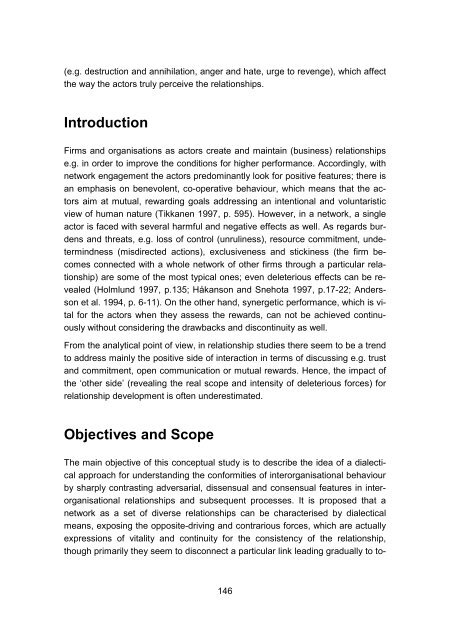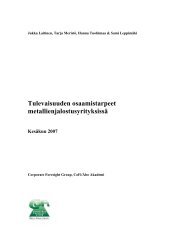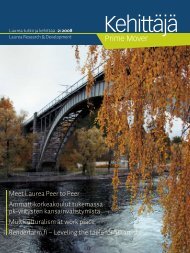849954 sisus
849954 sisus
849954 sisus
You also want an ePaper? Increase the reach of your titles
YUMPU automatically turns print PDFs into web optimized ePapers that Google loves.
(e.g. destruction and annihilation, anger and hate, urge to revenge), which affect<br />
the way the actors truly perceive the relationships.<br />
Introduction<br />
Firms and organisations as actors create and maintain (business) relationships<br />
e.g. in order to improve the conditions for higher performance. Accordingly, with<br />
network engagement the actors predominantly look for positive features; there is<br />
an emphasis on benevolent, co-operative behaviour, which means that the actors<br />
aim at mutual, rewarding goals addressing an intentional and voluntaristic<br />
view of human nature (Tikkanen 1997, p. 595). However, in a network, a single<br />
actor is faced with several harmful and negative effects as well. As regards burdens<br />
and threats, e.g. loss of control (unruliness), resource commitment, undetermindness<br />
(misdirected actions), exclusiveness and stickiness (the firm becomes<br />
connected with a whole network of other firms through a particular relationship)<br />
are some of the most typical ones; even deleterious effects can be revealed<br />
(Holmlund 1997, p.135; Håkanson and Snehota 1997, p.17-22; Andersson<br />
et al. 1994, p. 6-11). On the other hand, synergetic performance, which is vital<br />
for the actors when they assess the rewards, can not be achieved continuously<br />
without considering the drawbacks and discontinuity as well.<br />
From the analytical point of view, in relationship studies there seem to be a trend<br />
to address mainly the positive side of interaction in terms of discussing e.g. trust<br />
and commitment, open communication or mutual rewards. Hence, the impact of<br />
the ‘other side’ (revealing the real scope and intensity of deleterious forces) for<br />
relationship development is often underestimated.<br />
Objectives and Scope<br />
The main objective of this conceptual study is to describe the idea of a dialectical<br />
approach for understanding the conformities of interorganisational behaviour<br />
by sharply contrasting adversarial, dissensual and consensual features in interorganisational<br />
relationships and subsequent processes. It is proposed that a<br />
network as a set of diverse relationships can be characterised by dialectical<br />
means, exposing the opposite-driving and contrarious forces, which are actually<br />
expressions of vitality and continuity for the consistency of the relationship,<br />
though primarily they seem to disconnect a particular link leading gradually to to-<br />
146








